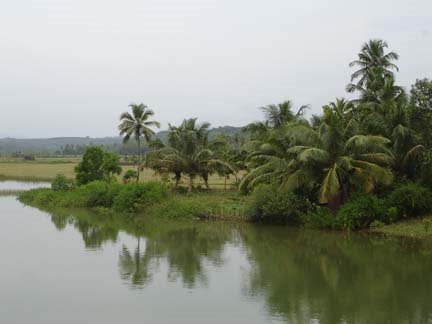Some places like
Bangalore have standard explanations for the origin of place name that is being
accepted and believed by people without questioning. This includes the
explanation for the worlds’ favorite software city, Bangalore. Some smart one dared
to think of the origin of Bengaluru (Bangalore) as a village of boiled beans
(benda + kaalu + ooru) and it has been
accepted in general.
However,
many like me may have their own doubts as to how the Benda-kaalu-ooru can become Bengal-ooru?
In formal and/or common dialectical Kannada, benda-kaalu (=boiled beans)
is not usually abridged to Bengaalu! Only in poetry such a union or words can be
expected. And it is quite unusual that a poetic term should become accepted as a place for Bangalore.
Alternate theory for Origin
How about an
alternate explanation for the origin of place name Bengaluru? The name
Bengaluru could have been a modification of original Bangalur. The place name
of Bangal+ur, the ooru (village) of Bengal or Bangal is similar to the Bengal
or Bangal in origin.
Bengāl / Bangal
Surprisingly,
the name Bengal in Bengaluru or
Bangalore is also shared by Bengal (West Bengal, East Bengal, Bangladesh)
region, where there is no widely accepted explanation for the origin of the
word Bengal, even though the current wiki page on Bengal suggests that the term
Bengal or Bongo may have been derived from the Bang tribes of Dravidian origin.
In this blog we have explained that the suffix –al represents an (ancient)
habitation located by the side of a river.
Banga being
a tribe the Bengal or Bangal (Banga +
al) means an ancient habitation
located on the bank of a river. In fact even today, the Bangal or the Bengal is
located on the banks of river Ganges.
Bangalore is
not on the banks of any river at present but the geological and
geomorphological evidences suggest that there was a river flowing on the western
side of Bangalore once upon a time. The river appears to have dried up during
the course of history.
Banga tribes
In different
parts of India we have hundreds of place names associated with or attributable
to ancient Banga tribes (Banga, Bangaria, Bangaon, Banganapalle, Bangarpalle,
Bangarpete, Bangadi, .Bangara, Bangaro, Bangatiya, Bangawa, Bangama, Bangai, Banganj,
etc ) Some of these places have been modified into prefix of Benga (Benali,
Bengahi, Bengabari, Benga male,. Banganur, Baengadi, Bengama, Bengaipatti,
Bengabad etc) . The Banga were an African tribe that apparently migrated and
settled in different parts of India during ancient period.
As in
Bengal, the term Vanga has been a regional modification of the term Banga. Some of the Vanga villages in India are
Vangara, Vangapalle, Vangai, Vangarai, Vangala, Vangali, Vangaon, Vangam,
Vangad, Vangapalle, etc. Similarly, especially in southern India, the term
Banga has become Panga (as in village name Pāngala) in some regions. Some of
the Panga- villages in different parts of India are Pangal, Pangali, Pangam,
Pangama, Pangar, Pangare, Pangari, Pangadi, Pangan, Pangaon, Pangaiyan, Pangath,
Pangarkhed etc.
Surname: Banga and Banger
The term
Banga has survived as a surname among the Jains of Tulunadu. Jain kings and chieftains with the surname
Banga or Banga-arasa ruled parts of Tulunadu until independence.
Banger or
Bangera is a most popular surname in Tulunadu common to many communities
irrespective of their socio-communal status. The Banger is a plural or
respectable for of the word Banga.
According to
African mythology the Banga was a water God of the Ngbandi people. According to
the African legends the Banga God created the white races. It is possible that
Banga tribes in India were part of the white or fair skinned immigrants who
have been documented distinctly as white tribes (Bola and Boller Tulu; Bellar -Kannada;
Gore - Marati/Prakrit/Hindi etc) especially in the place names of the Southern India.
Â



